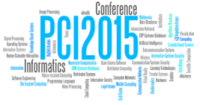 A scientific paper entitled “Propelling SMEs Business Intelligence through Linked Data Production and Consumption” has been presented by UBITECH at the 10th OTM/IFAC International Workshop on Enterprise Integration, Interoperability and Networking (EI2N’2015) that is part of the OnTheMove Federated Conferences & Workshops 2015 (OTM 2015). OTM 2015 is being held in Rhodes, Greece at October 26-29, 2015. At this paper, Eleni Fotopoulou and Anastasios Zafeiropoulos – along with other co-authors – propose an approach for the production of added-value business analytics through the consumption of interlinked versions of data and the exploitation of linked data principles. Furthermore, the paper includes the findings that were realised through the execution of the Business Intelligence Analytics pilot operation of the LinDA project, which concerns the examination of the effects of Over-The-Counter (OTC) medicines liberalisation in the OTC market pool and business opportunities in Europe. The analysis aims at identifying correlations between pharmaceutical, healthcare, socio-economic and political parameters and tackles several research questions that were identified at the initial steps of the analysis.
A scientific paper entitled “Propelling SMEs Business Intelligence through Linked Data Production and Consumption” has been presented by UBITECH at the 10th OTM/IFAC International Workshop on Enterprise Integration, Interoperability and Networking (EI2N’2015) that is part of the OnTheMove Federated Conferences & Workshops 2015 (OTM 2015). OTM 2015 is being held in Rhodes, Greece at October 26-29, 2015. At this paper, Eleni Fotopoulou and Anastasios Zafeiropoulos – along with other co-authors – propose an approach for the production of added-value business analytics through the consumption of interlinked versions of data and the exploitation of linked data principles. Furthermore, the paper includes the findings that were realised through the execution of the Business Intelligence Analytics pilot operation of the LinDA project, which concerns the examination of the effects of Over-The-Counter (OTC) medicines liberalisation in the OTC market pool and business opportunities in Europe. The analysis aims at identifying correlations between pharmaceutical, healthcare, socio-economic and political parameters and tackles several research questions that were identified at the initial steps of the analysis.
Source: http://onthemove-conferences.org/index.php/otm-program-2015/program-ei2n-2015

 UBITECH attends the “ICT 2015 – Innovate, Connect, Transform”, in Lisbon, Portugal on 20-22 October 2015, organised by the European Commission, together with the
UBITECH attends the “ICT 2015 – Innovate, Connect, Transform”, in Lisbon, Portugal on 20-22 October 2015, organised by the European Commission, together with the  UBITECH is happy to invite you to network and connect with us at the
UBITECH is happy to invite you to network and connect with us at the  UBITECH has actively participated in the kick-off meeting, in Nieuwegein, Netherlands (October 8-9, 2015) of the SUBSOL research project, officially started on September 1st, 2015. The project is funded by European Commission under Horizon 2020 Programme (Grant Agreement No. 642228) and spans on the period September 2015 – August 2018. SUBSOL targets at introducing a new way of thinking in terms of water resources management, promoting the sustainable development of coastal areas worldwide.
UBITECH has actively participated in the kick-off meeting, in Nieuwegein, Netherlands (October 8-9, 2015) of the SUBSOL research project, officially started on September 1st, 2015. The project is funded by European Commission under Horizon 2020 Programme (Grant Agreement No. 642228) and spans on the period September 2015 – August 2018. SUBSOL targets at introducing a new way of thinking in terms of water resources management, promoting the sustainable development of coastal areas worldwide. UBITECH participated at the Cloud Forward 2015 Conference that took place in Pisa, Italy at 6-8 of October 2015. The Cloud Forward 2015 Conference brought together experts from industry and academia to consider the future of and beyond Cloud Computing. The conference reviewed experiences and discussed future directions to overcome problems and provide new opportunities for the utilisation of leading edge Cloud Computing by industry and academia and for ICT developers providing innovative solutions. Dr. Constantinos Vassilakis participated on behalf of the ARCADIA and INPUT Horizon 2020 projects on the clustering activities organized within the conference and mainly the “Software Engineering for Services and Applications” cluster and the “New Approaches for Infrastructure Services” cluster. A set of presentations were provided concerning the overall objectives and approach followed in the ARCADIA project, as well as the current status of the white paper that is under preparation within the “Software Engineering for Services and Applications” cluster for describing current challenges and trends in the software engineering world.
UBITECH participated at the Cloud Forward 2015 Conference that took place in Pisa, Italy at 6-8 of October 2015. The Cloud Forward 2015 Conference brought together experts from industry and academia to consider the future of and beyond Cloud Computing. The conference reviewed experiences and discussed future directions to overcome problems and provide new opportunities for the utilisation of leading edge Cloud Computing by industry and academia and for ICT developers providing innovative solutions. Dr. Constantinos Vassilakis participated on behalf of the ARCADIA and INPUT Horizon 2020 projects on the clustering activities organized within the conference and mainly the “Software Engineering for Services and Applications” cluster and the “New Approaches for Infrastructure Services” cluster. A set of presentations were provided concerning the overall objectives and approach followed in the ARCADIA project, as well as the current status of the white paper that is under preparation within the “Software Engineering for Services and Applications” cluster for describing current challenges and trends in the software engineering world. UBITECH participated at the Critical Infrastructure Protection workshop at PCI 2015 that took place in Athens, Greece at 2nd of October 2015. In the workshop, several research initiatives were presented with regards to risk mitigation for Critical Infrastructure protection, Critical Infrastructure security and resilience, software defined security mechanisms along with applied tools for supporting ports security and assessing the risks for ports’ supply chain services. On behalf of UBITECH, Dr. Anastasios Zafeiropoulos presented a novel approach for designing and implementing software defined security mechanisms taking into account the opportunities that exist based on the evolvement of novel technologies such as Software Defined Networking (SDN) and Network Function Virtualization (NFV) technologies. Main security threats, challenges and opportunities for the design of advanced security solutions were presented taking into account different NFV deployment models. For more information, please
UBITECH participated at the Critical Infrastructure Protection workshop at PCI 2015 that took place in Athens, Greece at 2nd of October 2015. In the workshop, several research initiatives were presented with regards to risk mitigation for Critical Infrastructure protection, Critical Infrastructure security and resilience, software defined security mechanisms along with applied tools for supporting ports security and assessing the risks for ports’ supply chain services. On behalf of UBITECH, Dr. Anastasios Zafeiropoulos presented a novel approach for designing and implementing software defined security mechanisms taking into account the opportunities that exist based on the evolvement of novel technologies such as Software Defined Networking (SDN) and Network Function Virtualization (NFV) technologies. Main security threats, challenges and opportunities for the design of advanced security solutions were presented taking into account different NFV deployment models. For more information, please  LinkedDesign, a four-year initiative financed by the European Union under the Seventh Framework Programme for Research and Technological Development, today announced significant results achieved by developing and manufacturing administration leaders such as SAP, COMAU, Volkswagen Group, TRIMEK, Aker Solutions and HOLONIX, a subsidiary of the Milan Polytechnic and leading technology combination of the Internet of Things to Life Cycle Management of Products.
LinkedDesign, a four-year initiative financed by the European Union under the Seventh Framework Programme for Research and Technological Development, today announced significant results achieved by developing and manufacturing administration leaders such as SAP, COMAU, Volkswagen Group, TRIMEK, Aker Solutions and HOLONIX, a subsidiary of the Milan Polytechnic and leading technology combination of the Internet of Things to Life Cycle Management of Products. A poster entitled “Linked Data Analytics for Business Intelligence SMEs: A Pilot Case in the Pharmaceutical Sector” along with a relevant demo have been presented by LinDA consortium partners at the SEMANTiCS 2015 conference that was held in Vienna, Austria, on September 16-17, 2015. At this publication, Eleni Fotopoulou and Anastasios Zafeiropoulos – along with other co-authors – present the initial findings of the Business Intelligence Analytics (BIA) pilot operation of the LinDA project, which concerns the Over-The-Counter (OTC) medicines liberalisation in Europe. The pilot aims at examining the association among the usage of OTC medicines and pharmaceutical parameters, with other healthcare, socio-economic and political ones. Focus is given on the added value emerged, through the consumption and production of linked data for analysis purposes, as well as the challenges faced for the execution of such a pilot. For more information, you can download our poster
A poster entitled “Linked Data Analytics for Business Intelligence SMEs: A Pilot Case in the Pharmaceutical Sector” along with a relevant demo have been presented by LinDA consortium partners at the SEMANTiCS 2015 conference that was held in Vienna, Austria, on September 16-17, 2015. At this publication, Eleni Fotopoulou and Anastasios Zafeiropoulos – along with other co-authors – present the initial findings of the Business Intelligence Analytics (BIA) pilot operation of the LinDA project, which concerns the Over-The-Counter (OTC) medicines liberalisation in Europe. The pilot aims at examining the association among the usage of OTC medicines and pharmaceutical parameters, with other healthcare, socio-economic and political ones. Focus is given on the added value emerged, through the consumption and production of linked data for analysis purposes, as well as the challenges faced for the execution of such a pilot. For more information, you can download our poster 

